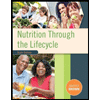
Concept explainers
To determine: The body size of Person T based on his weight-for-age, height-for-age, and BMI-for-age percentile.
Introduction: Centers for Disease Control and Prevention (CDC) growth charts are used to determine physical growth in children of 2–20 years of age. These charts are gender specific and are plotted in percentiles. These charts help in assessing and identifying health-related problems in children.
Explanation of Solution
Person T, aged 7-years, was examined in an annual visit to the pediatrician and was found to weigh 68 lb (31 kg), which was at the 95th percentile for his age. He had a height of 50 in. (127 cm), which was between 75th and 90th percentiles for his age. With the BMI (19.25) at the 95th percentile for his age, his growth percentiles were increasing every year. Person T has a habit of snacking, and his lifestyle does not include much physical activities.
Refer to illustartion 15.1 “CDC growth charts: United States”, given in the text book. Accroding to this CDC growth chart, weight of Person T is in upper range; height is above the normal range, and BMI is also above the normal range.
Want to see more full solutions like this?
Chapter 12 Solutions
Nutrition Through The Life Cycle
 Nutrition Through The Life CycleHealth & NutritionISBN:9781337919333Author:Brown, Judith E.Publisher:Cengage Learning,
Nutrition Through The Life CycleHealth & NutritionISBN:9781337919333Author:Brown, Judith E.Publisher:Cengage Learning, Nutrition Through the Life Cycle (MindTap Course ...Health & NutritionISBN:9781305628007Author:Judith E. BrownPublisher:Cengage Learning
Nutrition Through the Life Cycle (MindTap Course ...Health & NutritionISBN:9781305628007Author:Judith E. BrownPublisher:Cengage Learning- Case Studies In Health Information ManagementBiologyISBN:9781337676908Author:SCHNERINGPublisher:Cengage





